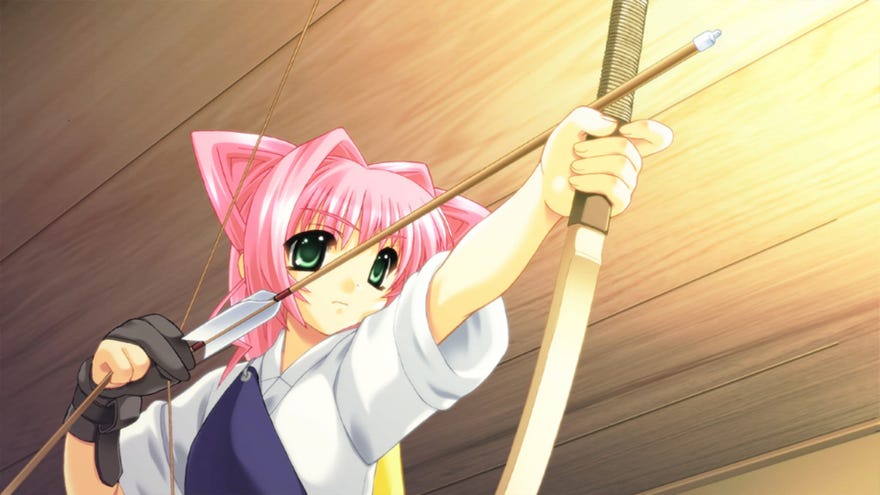How one of the greatest visual novels got an English translation because of its fans
Muv-what?
You might not know what Muv-Luv is. I hadn’t even heard of it till a few years ago. Which is strange, since Muv-Luv is considered by many to be one of the most greatest visual novels of all time. What begins as a light-hearted slice-of-life high school romantic comedy eventually pulls the rug out from under the player, and transforms into a war epic featuring mechs and aliens with a much darker tone. In Muv-Luv’s original Japanese release, this twist was hidden and only briefly hinted at in the marketing.
Today both Muv-Luv games are easily available on Steam, marketed specifically with this twist, and where they sit fully-translated and with Overwhelmingly Positive reviews. iOS and Android ports are apparently in development, and other Muv-Luv spin-offs continue to get translated. But the first time anyone experienced a complete English language version of Muv-Luv was in July 2010, when a fan translation group called Amaterasu released a patch localising the first game.
This was announced on Amaterasu’s now-offline blog, where they also hosted all of their fan translations. At the time the majority of English language Muv-Luv discussion on the internet at the time was kept to forums, imageboards, and the comment sections of YouTube videos. In the months leading up to the release of the patch, waves of new people started to discover the series. After its release, the Muv-Luv fandom continued to grow, propped up entirely through word of mouth and driven by the fact that the first game was finally accessible for English-speaking players.
Muv-Luv’s a visual novel in the most traditional sense of the term. Picture games like STEINS;GATE and Hatoful Boyfriend, and you’ve basically got the gist. There’s a lot of reading to do and your input boils down to selecting choices that lead to a specific ending. The series in general stands out for having a very high production value by visual novel standards, using plenty of unique images and animations.
February marked the 20th anniversary of the release of the first game in the series, simply titled Muv-Luv, and developed by a studio called âge (now known as aNCHOR). For years, its sequel — 2006's Muv-Luv Alternative, released after numerous delays — was ranked by players as the number one highest rated game on VNDB, a database for all sorts of visual novels. It’s still the second highest as of writing this. In Japan, Muv-Luv’s extremely popular. The series is far reaching enough that even the creator of the manga Attack On Titan has cited Muv-Luv as a huge influence on the series. It has several spin-offs, anime adaptations and manga. As you might expect, if you like visual novels, it’s hard to write off the success of Muv-Luv.
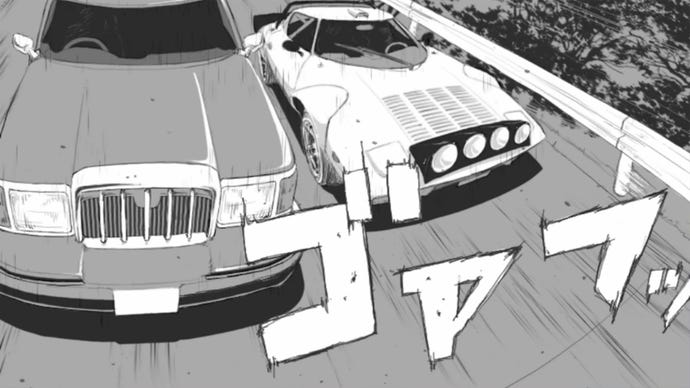
It's also deeply flawed. Both Muv-Luv and Alternative originally contained adult content, but an “all-ages” version of both was put out later in 2006, and it's version that’s persisted. In general, the series suffers from pacing issues, tonal shifts that don’t always work, and being needlessly, repeatedly crass. If you don’t already like visual novels, it probably won’t change your mind, particularly because the first and second game together span just over 70 hours. It’s not exactly puzzling why a business wouldn’t want to take the risk of localising it for a foreign market.
It’s not exactly puzzling why a business wouldn’t want to take the risk of localising it for a foreign market.
Interestingly enough, Amaterasu’s patch for Muv-Luv was only available online for a few months, and was taken down at the start of 2011 by Amaterasu themselves. In a blog post, Amaterasu mentioned they were currently negotiating a deal with âge, wouldn’t be hosting any of their translations as a result, and that Amaterasu wouldn’t “be asking for any money in exchange for the translation.” A few months later, in March, Amaterasu’s still-in-progress English translation of Alternative leaked before it was complete. For the majority of Muv-Luv fans this was an opportunity to get their hands on more Muv-Luv, and Amaterasu announced in response that they’d be staying silent until they had anything to show.
After eight months of silence surrounding what was happening, Amaterasu finally posted a giant statement to their blog covering what had happened behind the scenes. Mangagamer, a video game publisher that deals with English localisations of Japanese visual novels, was negotiating with âge on Amaterasu’s behalf. Despite months of discussions, Amaterasu were told that âge were not willing to licence the Muv-Luv games, and instead had offered the option to licence another game called Kimi ga Nozomu Eien (an older visual novel that has little to do with Muv-Luv).
Attached to Amaterasu’s statement was a free link to their finished translation of Muv-Luv Alternative, and a reupload of the original English patch for the first game. Mangagamer, as you might expect, were not happy, and issued a response in 2011 saying as much.
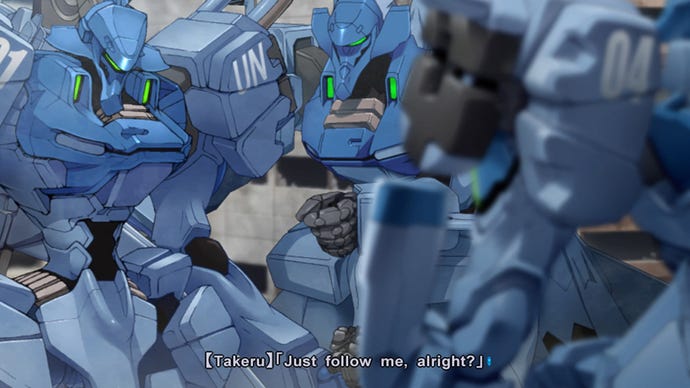
I reached out to Amaterasu through a Facebook page to ask them more about this and, surprisingly, actually got a response from a member:
“We were uncertain about the future of securing a licence. A patch had already been leaked with the translation, even though we had declared secrecy on the matter," they said. "A combination of uncertainty in 2011 and with the patch being leaked led us to deciding to release our translation officially when we were able to get together a proper patch.”
For the next few years, the only legal way to play Muv-Luv in English required importing a copy of the game from Japan somehow, and then applying the unofficial Amaterasu patch to it. After the whole ordeal, Amaterasu moved on to translating other games - but the popularity of their patch had proven that there was an English-speaking audience that wanted more Muv-Luv. Another fan translation group called Alternative Projects formed to fill the space that had been left behind. As their blog aptly self-describes itself, it was “Muv-Luv Translations by the fans for the fans.”
Seemingly out of nowhere, in 2015, a Kickstarter campaign to officially localise Muv-Luv in English was launched. At the time, there was a precedent for other Japanese visual novels getting localised through Kickstarter; Clannad, for example, had raised over $540,000 earlier that year. But visual novels in general still weren’t commonplace on Steam — the first few had only started appearing on the platform in 2012.

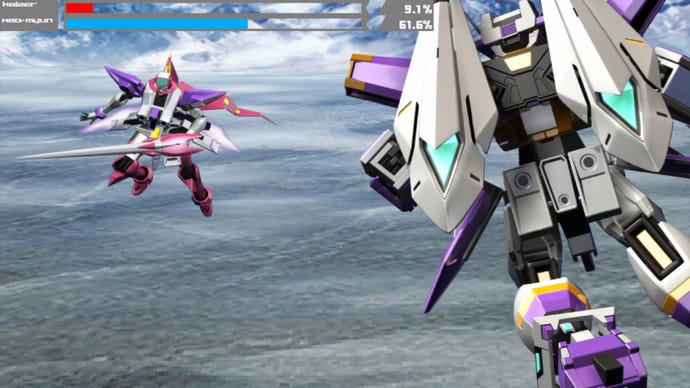
I contacted Aalt, a fan of Muv-Luv who runs an English language blog that partially covers the series, to find out more. He was asked to join the translation team for the Kickstarter but couldn’t at the time, so instead helped contribute to other areas of the campaign. Aalt tells me that he wasn’t aware of how the Kickstarter began but that he does think “Alternative Projects was an instrumental part of it though, as their translations were high quality for fan translations.”
The campaign was being run as a joint project between âge and a Japanese software company called Degica (perhaps best known for localising RPG Maker). In a podcast featuring Aalt, the leader of Alternative Projects, Degica’s community manager, and Degica’s global manager, it was clarified that Degica and âge had been introduced through a mutual client. But âge’s parent company ixtl was very enthusiastic about the idea of an English translation being funded through Kickstarter.
Within seven hours of the campaign going live, it had already reached its goal of $250,000. By the end of the campaign Muv-Luv had raised over $1.25 million. That's more than Double Fine raised for their game Massive Chalice, and with a fraction of the backers,; Muv-Luv had only 7,890 relative to the tens of thousands for Massive Chalice.
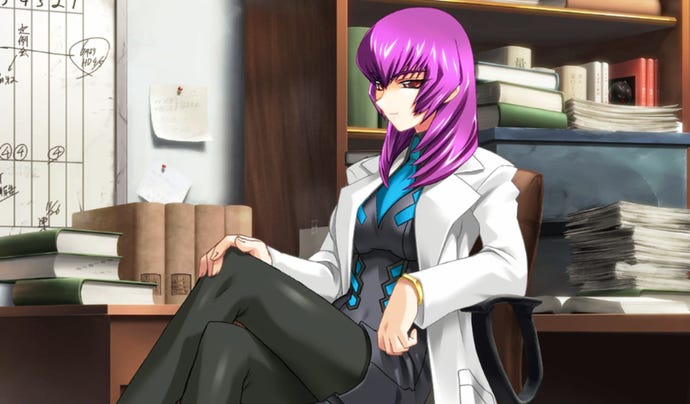
A key feature of the Kickstarter was a re-translation of the series helmed by figures in the community, where the team was made up of both members of Alternative Projects and professional translators that were fans. Amaterasu confirmed to me that Degica bought the rights to their fan translation, and that the re-translation was done using the original Amaterasu translation as a basis. In the end it worked out slightly differently, as Aalt clarified. “The team ended up translating the whole thing from start to finish," he said, "with less than 3% of Amaterasu’s script being used if I remember right.”
Over 13 years after Muv-Luv launched initially, on the 15th of July 2016, Muv-Luv was finally purchasable on Steam for English fans. Muv-Luv Alternative was later released in September 2017. Looking back at it, it strikes me that at every key moment in the history of Muv-Luv’s localisation, it was the involvement of fans that spurred everything on. Every step required volunteers who wanted nothing more than to share what they enjoyed with other people.
“Fan translations ultimately have to carry the torch before the official translations happen,” Aalt said. “Fan translations have shown that the market exists, it's all about tapping it.” The Amaterasu member had simlar thoughts. “It seems localisation tends to be limited to titles that have already been translated, for the most part," they said. "I do not believe (Muv-Luv) would've gotten to that point if no one had translated it, Amaterasu or anyone else.”
